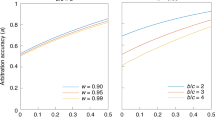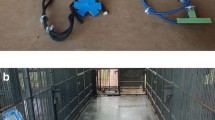Abstract
Monkeys form expectations for outcomes based on interactions with human experimenters. Capuchins, a cooperative New World monkey species, not only anticipate receiving rewards that the experimenter indicates, but also apparently anticipate rewards based on what the experimenter has given to their partners. However, this could be due to subjects responding to either outcomes or experimenters. Here we examine whether capuchins will continue to interact with human experimenters who are occasionally unreliable. We tested 10 monkeys with a series of familiar human experimenters using an exchange task. The experimenters had never before participated in exchange studies with these monkeys, hence the monkeys learned about their behavior during the course of testing. Occasionally experimenters were unreliable, failing to give a reward after the monkey returned the token. The monkeys did recognize these interactions as different, responding much more quickly in trials following those that were nonrewarded than in other situations with the same experimenter. However, subjects did not change their preference for experimenters when given the opportunity to choose between the unreliable exchanger and another exchanger, nor did subjects learn to prefer reliable experimenters from watching other monkeys’ interactions. Instead, subjects returned the tokens to the same location from which they received it. These results indicate that capuchins may not be sensitive to isolated instances in which experimenters are unreliable, possibly because of a strong bias to returning the token to the location from which it was donated.


Similar content being viewed by others
References
Brosnan, S. F., & de Waal, F. B. M. (2003). Monkeys reject unequal pay. Nature, 425, 297–299.
Brosnan, S. F., & de Waal, F. B. M. (2004a). A concept of value during experimental exchange in brown capuchin monkeys. Folia Primatologica, 75, 317–330.
Brosnan, S. F., & de Waal, F. B. M. (2004b). Socially learned preferences for differentially rewarded tokens in the brown capuchin monkey, Cebus apella. Journal of Comparative Psychology, 118(2), 133–139.
Brosnan, S. F., Earley, R. L., & Dugatkin, L. A. (2003). Observational learning about predator inspection in guppies, Poecillia retiuclata. Ethology, 109, 823–833.
Brosnan, S. F., Freeman, C., & de Waal, F. B. M. (2006). Partner’s behavior, not reward distribution, determines success in an unequal cooperative task in capuchin monkeys. American Journal of Primatology, 68, 713–724.
Bshary, R., & Grutter, A. S. (2006). Image scoring and cooperation in cleaner fish mutualism. Nature, 441, 975–978.
Call, J., Hare, B., Carpenter, M., & Tomasello, M. (2004). ‘Unwilling’ versus ‘unable’: chimpanzees understanding of human intentional action. Developmental Science, 7, 488–498.
Chen, M. K., & Hauser, M. D. (2005). Modeling reciprocation and cooperation in primates: Evidence for a punishing strategy. Journal of Theoretical Biology, 235, 5–12.
Chen, M. K., Lakshminarayanan, V., & Santos, L. R. (2006). How basic are behavioral biases? Evidence from capuchin monkey trading behavior. Journal of Political Economy, 114(3), 517–537.
de Waal, F. B. M. (1997). Food transfers through mesh in brown capuchins. Journal of Comparative Psychology, 111(4), 370–378.
de Waal, F. B. M., & Berger, M. L. (2000). Payment for labour in monkeys. Nature, 404, 563.
Dugatkin, L. A., & Alfieri, M. (1991). Guppies and the TIT FOR TAT strategy: preference based on past interaction. Behavioral Ecology and Sociobiology, 1991(28).
Ferster, C. B., & Skinner, B. F. (1957). Schedules of reinforcement. New York: Appleton-Century-Crofts.
Fletcher, G. E. (2008). Attending to the outcome of others: Disadvantageous inequity aversion in male capuchin monkeys (Cebus apella). American Journal of Primatology, 70, 901–905.
Girndt, A., Meier, T., & Call, J. (2008). Task constraints mask great apes’ ability to solve the trap-table task. Journal of Experimental Psychology: Animal Behavior Processes, 34(1), 54–62.
Grier, J. B. (1971). Nonparametric indexes for sensitivity and bias: Computing formulas. Psychological Bulletin, 75, 424–429.
Hyatt, C. W., & Hopkins, W. D. (1998). Interspecies object exchange: Bartering in apes? Behavioural Processes, 42, 177–187.
Melis, A. P., Hare, B., & Tomasello, M. (2006a). Chimpanzees recruit the best collaborators. Science, 311, 1297–1300.
Melis, A. P., Hare, B., & Tomasello, M. (2006b). Engineering cooperation in chimpanzees: Tolerance constraints on cooperation. Animal Behavior, 72, 275–286.
Mundry, R., & Fischer, J. (1998). Use of statistical programs for nonparametric tests of small samples often leads to incorrect P values: examples from Animal Behaviour. Animal Behaviour, 56, 256–259.
Perry, S., Panger, M., Rose, L., Baker, M., Gros-Luis, J., Jack, K., et al. (2003). Traditions in wild white-faced capuchin monkeys. In D. M. Fragaszy & S. Perry (Eds.), The Biology of Traditions: Models and Evidence. Cambridge, UK: Cambridge University Press.
Phillips, W., Barnes, J. L., Mahajan, N., Yamaguchi, M. & Santos, L. R. (2009). ‘Unwilling’ versus unable’: Capuchins’ (Cebus apella) Understanding of human intentional action? Developmental Science. doi:10.1111/j.1467-7687.2009.00840.x
Russell, Y. I., Call, J., & Dunbar, R. I. M. (2008). Image scoring in great apes. Behavioural Processes, 78, 108–111.
Stanislaw, H., & Todorov, N. (1999). Calculation of signal detection theory measures. Behaviour Research Methods, Instruments & Computers, 31, 137–149.
Subiaul, F., Vonk, J., Okamoto-Barth, S., & Barth, J. (2008). Do chimpanzees learn reputation by observation? Evidence from direct and indirect experience with generous and selfish strangers. Animal Cognition, 11, 611–623.
Tinklepaugh, O. L. (1928). An experimental study of representative factors in monkeys. Journal of Comparative Psychology, 8, 197–236.
van Wolkenten, M., Brosnan, S. F., & de Waal, F. B. M. (2007). Inequity responses in monkeys modified by effort. Proceedings of the National Academy of Sciences, 104(47), 18854–18859.
Wood, J. N., Glynn, D. D., Phillips, B. C., & Hauser, M. D. (2007). The perception of rational, goal-directed action in nonhuman primates. Science, 317, 1402–1405.
Acknowledgments
We thank Lisa Bradley, Jason Davis, Marietta Dindo, May Lee Gong, and Laura Mullen for assisting with data collection; 2 anonymous reviewers for comments on an earlier draft of the manuscript; and the animal care and veterinary staff of the Yerkes National Primate Research Center for care for our subjects. S. F. Brosnan was funded by a National Science Foundation Human and Social Dynamics Grant (SES 0729244) and the laboratory was funded by NSF grant (IOS-0718010) to the senior investigator. The YNPRC is fully accredited by the American Association for Accreditation for Laboratory Animal Care.
Author information
Authors and Affiliations
Corresponding author
Rights and permissions
About this article
Cite this article
Brosnan, S.F., de Waal, F.B.M. Cebus apella Tolerate Intermittent Unreliability in Human Experimenters. Int J Primatol 30, 663–674 (2009). https://doi.org/10.1007/s10764-009-9366-x
Received:
Accepted:
Published:
Issue Date:
DOI: https://doi.org/10.1007/s10764-009-9366-x




